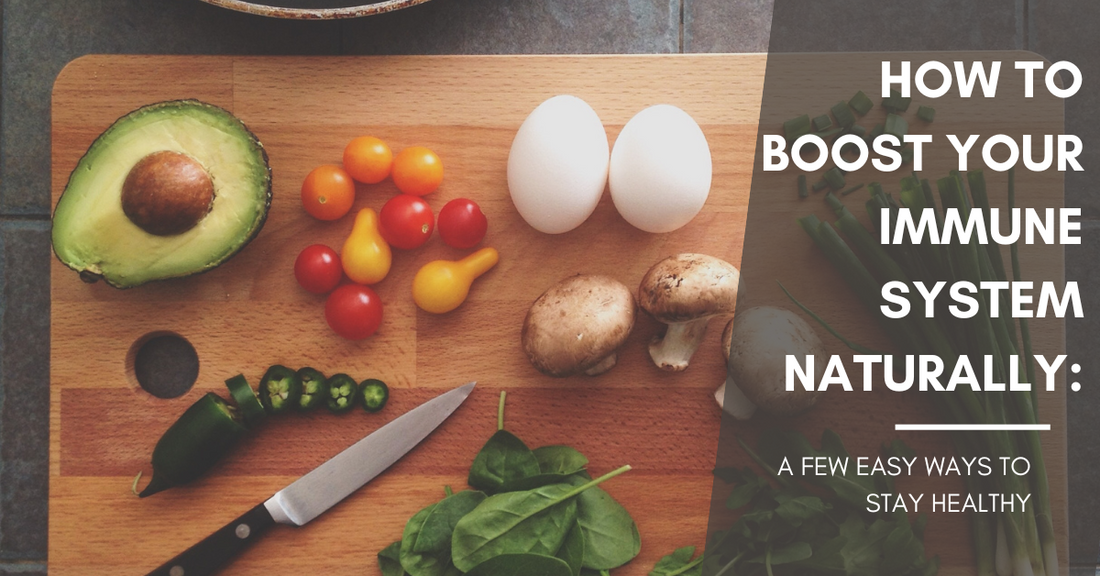
How To Boost Your Immune System Naturally: A Few Easy Ways to Stay Healthy
Share
Boosting your immune system can feel like a challenging task, but it doesn't have to be. Think of it as a nurturing garden, with the right care and attention, your body can thrive.
Keeping your immune system strong is key to feeling great and staying healthy. With the right lifestyle choices and natural remedies, you can give your body the support it needs to stay protected from harmful illness-causing germs. Here we will explore easy ways to lead a healthier life by enhancing the immune system.
Table of Contents
- How to boost the immune system naturally. Let's start with the basics:
- How can you improve the immune system naturally?
- How does ageing affect our immune system, and how can we take care of it?
- How herbs and supplements increase the effectiveness of the immune system?
- Conclusion
- Frequently asked questions
- 1. How do you make the immune system strong?
- 2. How can we take care of our immune system?
- 3. Which food items should be avoided to keep the immune system healthy?
- 4. What is the appropriate amount of sleep needed for a person?
- 5. Does smoking have a bad impact on the immune system?
How to boost the immune system naturally. Let's start with the basics:
- Limiting smoking and alcohol consumption.
- Eat fruits and vegetables.
- Regular exercises
- Maintaining a healthy weight.
- Adequate sleep
- Try to minimise stress.
- Washing hands before and after a meal helps maintain hygiene.
How can you improve the immune system naturally?
Improving your immune system naturally is like giving your body the TLC (tender loving care) it deserves. Here are a few ways in which you can take care of your immune system naturally:
- Adequate Sleep: Imagine this cosy evening where you think you get a full night's rest because sleep is when the body gets the chance to heal itself and rejuvenate.
- Eating nutrient-rich food: Imagine savouring a plate filled with fruits, vegetables, and whole grains, knowing every bite fuels your body with the nutrients it needs to fight off intruders in the form of germs.
- Exercise: Think of the joy and energy one feels after doing a brisk walk or fun workout in the gym. It keeps not only the body fit but also the immune system healthy.
- Stress: Stress is a silent enemy. However, practising meditation techniques can help you stay calm. The idea is to give time to things that can help you overcome stress. Practised hobbies can also work wonders.
- Stay hydrated: Drinking plenty of water can help flush the toxins out of the body. Inculcating these simple yet nurturing habits can enhance our immune system and lead us to a healthier life.
It's important to consider other factors that impact the immune system, and a few ways to take care of it.

How does ageing affect our immune system, and how can we take care of it?
- Changes throughout the body: As you age, your immune system undergoes several changes. Our body becomes more sensitive to physical activities and eating habits. Thus impacting the effectiveness of our immune system.
- Prone to the risks of infections: This natural decline means older adults are more susceptible to infections and diseases and may not respond robustly to vaccines.
- Reduced immunity: The body's ability to detect and respond to pathogens declines, and their natural response also becomes slower, which even leads to a failure to recognise harmful intruders.
- Life-threatening diseases: The contribution of age-related diseases, for example, heart disease, diabetes, and cancer, also weakens the immune system and its capacity to respond. Thus, caring for and maintaining your physical health becomes necessary.
- Lifestyle changes for the rescue: Include eating healthy, regular physical activity like swimming and walking, and adequate sleep to regenerate and repair capacity.
- Knowing your body well: Understanding these effects can help us make informed decisions about our health and well-being as we age.
- Leading a mindful life: Managing stress by being mindful, practising meditation to calm the body, and practising hobbies helps reduce the negative impact of stress on the immune system.
- Regular Check-ups: Ensure maintaining a stronger and more resilient immune system through regular visits to your doctor during old age.
How herbs and supplements increase the effectiveness of the immune system?
When you enter a store, you may notice a variety of herbs and supplements designed to enhance your immune system naturally or with chemicals. Let's examine their effectiveness in supporting the immune system.
- Echinacea, elderberry, garlic, and supplements like vitamin C, vitamin D, and zinc can help boost your immunity.
- Echinacea may shorten colds, and elderberries have antiviral properties. Further, vitamin C and zinc support the immune system's health.
- Depending on supplements, sometimes an excess of these can lead to deteriorating health, diet, exercise, sleep, and stress management. High doses can also cause side effects.
- Therefore, supplements and herbs should be approached in a balanced way, and consulting a doctor before self-medication is suggested.

Conclusion
Boosting the immune system is necessary for a hassle-free, healthy life. Nurturing the immune system is like taking care of a flourishing garden; you provide the right nutrients, care, and attention. By prioritising rest, sleep, hydration, exercise, stress management, and maintaining meaningful connections with others, you are not only boosting your immune system, but you’re also embracing a healthier, happier lifestyle. Taking these small steps can make a real difference and create a positive impact.
Frequently asked questions
1. How do you make the immune system strong?
To strengthen your immune system, eat a balanced diet rich in fruits, vegetables, lean proteins, and whole grains, and stay hydrated. Regular exercise, quality sleep approximately 8 hours), and stress management through techniques like medication is crucial. Good hygiene practices and social connections also support immune health. Avoid smoking and limit alcohol consumption to keep your immune system functioning optimally.
2. How can we take care of our immune system?
Taking care of your immune system involves simple habits that support your body's defence. Eat a variety of nutritious foods, stay hydrated, and get regular exercise to keep your immune cells active. Prioritise sleep to recharge your body. Manage stress through activities you enjoy and connect with others for emotional support. Practise good hygiene, like washing hands regularly. These small steps nurture your immune system, helping you stay healthy and resilient.
3. Which food items should be avoided to keep the immune system healthy?
Try to avoid certain foods that may increase inflammation and hurt your immune system:
- Foods that are high in sugar, junk food, sodium, and trans fat
- Canned food, processed meat, and other processed items.
- It is always a good idea to limit alcohol consumption.
4. What is the appropriate amount of sleep needed for a person?
For an adult, eight hours of sleep is mostly suggested by doctors. But this varies from person to person. However, getting enough sleep may hurt the immune system, as it gets weakened if continued for a longer period. Sleep deprivation hinders the body's ability to produce essential substances such as antibodies and cytokines.
5. Does smoking have a bad impact on the immune system?
Yes. Smoking hurts the immune system. Research also shows that smoking increases the risk of some immune and autoimmune disorders.
